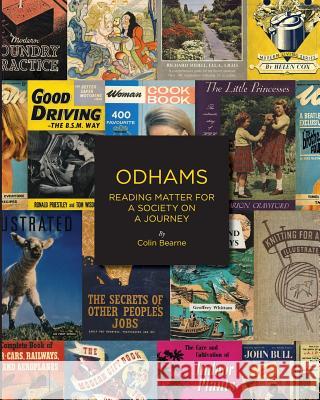Odhams: Reading Matter for a Society on a Journey » książka
Odhams: Reading Matter for a Society on a Journey
ISBN-13: 9781684196951 / Angielski / Miękka / 2016 / 106 str.
There are a number of factors, largely interrelated, attracting me to write this survey. First, there was a family connection with Odhams through my maternal grandfather. This was one of the reasons which led to me spending my formative years in Watford, the town which saw the full flourishing and the final sad demise of the firm. Not surprisingly most of the many books in our household came from Odhams. I have, over the years since childhood, amassed a collection of more than 400 of these titles. Odhams became, in its heyday, one of the country's major book, newspaper and periodical producers, at the cutting edge of printing and photogravure technology. The output of so many books from such a source is very much worth close study. As I view them again I am trying to provide an assessment of the firm's book output, as far as I know something never attempted before. The history of Odhams Press has been presented to the public twice. On the first occasion when one of the family - W.B.Odhams - covered the period from roughly 1840 to the year he retired from the management - 1935. Basically this is an autobiography, and as such has unfortunately little to do with books and deals at length with newspapers and illustrated magazines. It also has to do with personalities, notably the man who became the guiding spirit of the firm - Julius Salter Elias. The latter's biography, published under the title Viscount Southwood - in his later years Elias had been elevated to the peerage - covers the period up to his death in 1946 and begins with his first association with the firm. It, also, has little to say about book production and deals in the main with newspapers and magazines. What can now be viewed as the house's declining years up to the 1970s and the various amalgamations and take-overs, have been given general treatment, but never been chronicled in detail. In the absence of informative archive material I am making general judgements, based on just the books themselves, which may in the end be the right thing to do.
There are a number of factors, largely interrelated, attracting me to write this survey. First, there was a family connection with Odhams through my maternal grandfather. This was one of the reasons which led to me spending my formative years in Watford, the town which saw the full flourishing and the final sad demise of the firm. Not surprisingly most of the many books in our household came from Odhams. I have, over the years since childhood, amassed a collection of more than 400 of these titles. Odhams became, in its heyday, one of the country’s major book, newspaper and periodical producers, at the cutting edge of printing and photogravure technology. The output of so many books from such a source is very much worth close study. As I view them again I am trying to provide an assessment of the firm’s book output, as far as I know something never attempted before.The history of Odhams Press has been presented to the public twice. On the first occasion when one of the family – W.B.Odhams – covered the period from roughly 1840 to the year he retired from the management – 1935. Basically this is an autobiography, and as such has unfortunately little to do with books and deals at length with newspapers and illustrated magazines. It also has to do with personalities, notably the man who became the guiding spirit of the firm – Julius Salter Elias. The latter’s biography, published under the title Viscount Southwood – in his later years Elias had been elevated to the peerage – covers the period up to his death in 1946 and begins with his first association with the firm. It, also, has little to say about book production and deals in the main with newspapers and magazines.What can now be viewed as the house’s declining years up to the 1970s and the various amalgamations and take-overs, have been given general treatment, but never been chronicled in detail.In the absence of informative archive material I am making general judgements, based on just the books themselves, which may in the end be the right thing to do.











